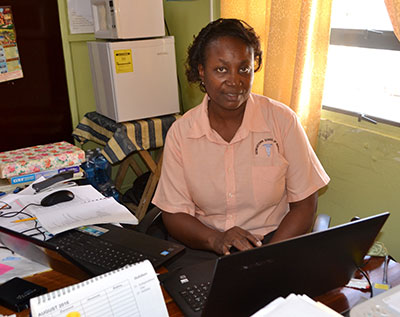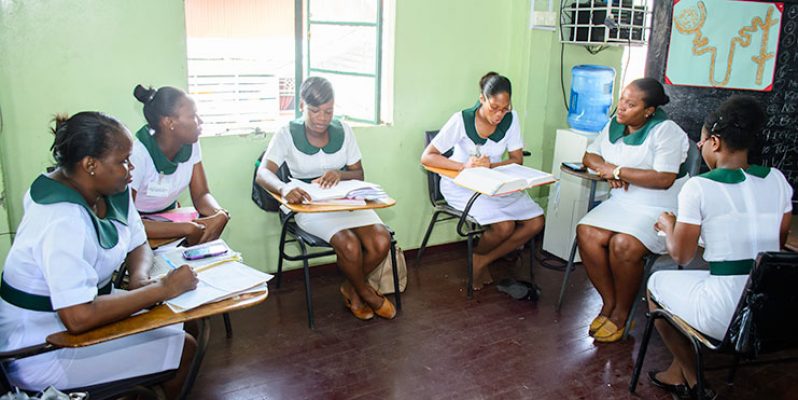Indisputably, nursing in Guyana has faced many stumbling blocks but with the strong backing of the Pan American Health Organisation (PAHO) and the Public Health Ministry, Principal of the Georgetown School of Nursing Cleopatra Barkoye is convinced that the sector can achieve much more than to keep its head above rough waters.
Statistical reports indicate that 60 per cent of the more than 300 students that enter Public

Nursing Schools annually, either through the Georgetown School of Nursing, the Charles Roza School of Nursing in Linden or the New Amsterdam School of Nursing, are successful at their final examination.
PAHO, the Ministry and the Department of Nursing are working to improve the pass rate and will be placing greater emphasis on the curriculum, qualification, experience of tutors and the screening of applicants.
Though the majority of the nursing tutors have acquired their Bachelors of Science Degrees in Nursing, and collectively have more than 300 years of experience under their belt, Barkoye said there was still a great need to sharpen their skills. As such, a Nursing Tutor Certificate Training Programme was initiated with the primary support of PAHO. The one-year online training programme, which commenced in 2015, had attracted 25 tutors, including those from the St Joseph Mercy Hospital School of Nursing.
But Principal Barkoye believes that even with capacity-building for the tutors, the Nursing Programme in Guyana should be revamped, explaining that it should not be taught at the level of a school but a university.

she is conducting one of her many sessions
“The Caribbean and the world at large have left us behind. They are two steps ahead of us. They are saying that really and truly the Registered Nursing Programme is done at universities,” she posited.
FOUNDATION BEING LAID
This, however, will require significant preparations. According to the Principal Tutor, the foundation work is being laid. It was explained that in 2015, a PAHO sponsored visit was made to Belize where discussions were initiated on the possibility of having Guyanese tutors acquire their Masters of Science in Nursing. This, Principal Barkoye said, is expected to materialise by 2017.
Once the tutors are adequately qualified, the Principal Tutor hopes that steps will then be taken at the level of the Public Health Ministry to have the Registered Nursing Programme dissolved at the level of the schools and offered only at the Bachelor’s level at the University of Guyana.
“When you have a Bachelor’s you have a wider scope of knowledge, and you will recognise that research is really important because that is how we practice,” she posited.
Will the proposed dissolution of the Registered Nursing Programme result in the closure of the Georgetown School of Nursing and similar schools across the country? Principal Barkoye when asked responded in the negative, explaining that the Post Basic Midwifery Programme, the Direct Entry Midwifery Programme, and the Nursing Assistant Programme will still be taught at the level of the school.
“While there is still a need for the school, the registered nursing programme must move beyond the school because that is where the world is and if we stay here we will always keep ourselves behind. If the world is moving, we have to move with it,” Principal Barkoye posited.
In Guyana, the Registered Nursing Programme is complemented by a Bachelor of Science in Nursing Programme which is offered at the University of Guyana for a period of two years.
The Bachelor of Science Degree in Nursing commenced in 2002 under the leadership of Mrs Gwendolin Tross – a veteran in the field of health education and nursing.
On her return to Guyana in 1998 Tross had joined the University in the Faculty of Health Sciences; however, she was disappointed that nurses were still unable to specialise in nursing at the level of the university.
“I was concerned that after spending many years abroad, the university was not offering a degree course for nurses, bearing in mind that it was an expectation before I left Guyana in 1979,” Sister Tross said.
She added: “There was a degree course in education but not for nursing.”
Subsequent to a series of discussions with Dean of the Faculty of Health Sciences, Dr Emanuel Cummings, Sister Tross took up the challenge to develop the Bachelor of Science Degree in Nursing.
In 2002, the programme was launched with a total of 19 students who had opted to specialise either in Management, Education or Nursing.
Despite many challenges, the first batch of students graduated in 2004 from the University of Guyana. “One of our graduates received the highest grade point average in the Faculty of Health Sciences. Over the years many of our students’ research papers were accepted for publication by the Caribbean Medical Council,” said a proud Sister Tross. Today, the Bachelor’s in Nursing Programme continues to evolve.
COLLABORATION
The success of the programme could not have been possible without the unwavering support of internal and external forces, she pointed out. “We had a lot of collaborative efforts,” she posited while singling out the Association of Guyanese Nurses and Allied Professionals, which is based in England.
“Every year they gave us money, 100 British pounds to be exact, for the best graduating student… they gave us extra money to purchase trophies and they still do it today.”
The Canadian Society for International Health was also instrumental in upgrading the faculty. “With the help of them, we extended the class rooms and…set up a resource centre,” Tross said. The research centre was named in honour of GwendolinTross.
By 2008, an online Master’s Nursing Programme was developed following close collaboration with the St Joseph College, Connecticut. Seven nurses were the first to capitalise on the online programme. For her pioneering work, Tross, in 2015, was awarded the Golden Arrow of Achievement.
Notwithstanding its limitations, nursing has been long recognised as the backbone of the Health Care System in Guyana. The process of ‘Guyanising’ had started in 1935 after concerns were raised over what was described as a determined effort to retain managerial positions for expatriate nurses, who primarily hailed from Great Britain.
“The question of promoting locally trained nurses as Divisional Sisters was considered, and it was the view of the (Legislative) Council that selected locally-trained nurses should be given every opportunity to qualify for managerial positions. Since further training in the United Kingdom was considered to be necessary qualifications, the Government agreed to assist suitable persons to obtain such training by contributing to their travel and other expenses,” Guyana’s first Principal Nursing Officer Gloria Noel said as she chronicled the development of the profession in the book ‘The History of Nursing in Guyana: 1800-1977.’
However, it was only until 1952 that a Guyanese was appointed Matron in the person of Irma Premdas. By 1970, a Department of Nursing was established within the Ministry of Health and a Principal Nursing Officer appointed. That officer is currently known as the Chief Nursing Officer, and continues to take pride in the management of the nursing profession with emphasis on education and practice.
Similarly, the Department of Nursing is responsible for the establishment of plans and programmes that are consistent with the National Health Policies and Plans.
“Nursing policies, standards and norms of nursing care are also formulated, monitored, and evaluated at this level,” Noel explained.
EVOLVED GREATLY
Under the watch of the Ministry and by extension the Department of Nursing, the nursing profession in Guyana has evolved tremendously with nurses now given the opportunity to specialise in various fields besides midwifery. These include pediatrics, anesthesiology, psychiatry and neonatal care.
“The genesis of organised nursing was in the early 19th century, and the first recorded nurses were males, who received no formal training and carried out menial tasks in the hospital. In 1831, female nurses were introduced, and they too received no formal training but worked under the supervision of the Surgeon General,” the former Principal Nursing Officer said as she recapped the history of nursing on the basis of which nursing education was developed.
It was only until 1945 that the first school of nursing was established here at the Georgetown Hospital. Today, Guyana boasts of having four nursing schools of which one is privately managed by the St Joseph Mercy Hospital.
These schools offer a three-year diploma programme for registered nurses, however, students are required to take and pass the General Nursing Council Examination in order to be registered to practice.
In the past, applicants were required to have four subjects including Mathematics, English and Science, however, an additional subject is now required. However, health authorities are still concerned over the high failure rate. It is estimated that close to 40 per cent of the current student population fail. In recent years, steps have been taken to reintroduce the interview process. As such, all applicants are now required to be interviewed before being granted the opportunity to commence training in the field of nursing.
In addition to the Registered Nursing Programme, the Schools of Nursing which are managed by the Ministry of Public Health offer a two-year Nursing Assistant Programme, a one-year Post-Basic Midwifery Programme and the two-year direct entry midwifery programme. The Public Health Nursing Programme is currently on hold.
The Nursing Assistant Programme was implemented in 1969 following the completion of a study which concluded that there were a number of nursing tasks which could have been performed by an assistant under the supervision of the professional nurse.
“After successful completion, graduates are eligible to take the Nursing Council Exam for registration,” Noel explained while noting that “Nursing Assistants are eligible for enrollment in the professional nursing programme provided that they acquire the academic requirements, and have a satisfactory work history.”
Pauline Parris, a Midwifery Tutor, trains approximately 25 midwives every year at the Georgetown School of Nursing. “You must be a Registered Nurse or a Nursing Assistant, in order to do the post-basic midwifery programme,” she explained.
However, she pointed out that there is a “Single Trained” Programme which attracts health workers from the community level to undergo midwifery training for a period of two years.
“Although you are selected by your village, you must have the required qualifications but that programme is two years because you have to do one year basic nursing and then you do the one year midwifery programme,” Parris explained.
Whether you are doing the Post-Basic or the Single Trained Midwifery Programme, all students are required to have 25 deliveries before permission is granted to write the Council’s exam. But before delivering the first baby, Parris said, trainees must first witness 12 deliveries
“You must see 12 deliveries under the midwife watch and certain questions must be answered before permission is granted for you to do the 25 deliveries. If you don’t complete you cannot write the exam,” she explained.
Today midwifery is dominated by women; however, there are male midwives. Males were introduced to the midwifery programme in Guyana in the mid-1970s to respond to a shortage of midwives the country was experiencing at a time. Wayne Deane and Parsram Persaud were the first to commence post-basic training in midwifery – a move which was widely accepted and saw an increase in male admission to the programme.
According to reports, Guyana was the first country in the Caribbean to have opened up the midwifery programme to males.
“Nursing is a dynamic profession constantly changing to meet societal needs, but one thing is certain: despite changes in the health system and changes in nursing, nurses in Guyana will always remain the backbone of the health system and the fundamentals of nursing will never change,” Noel said.




.png)









